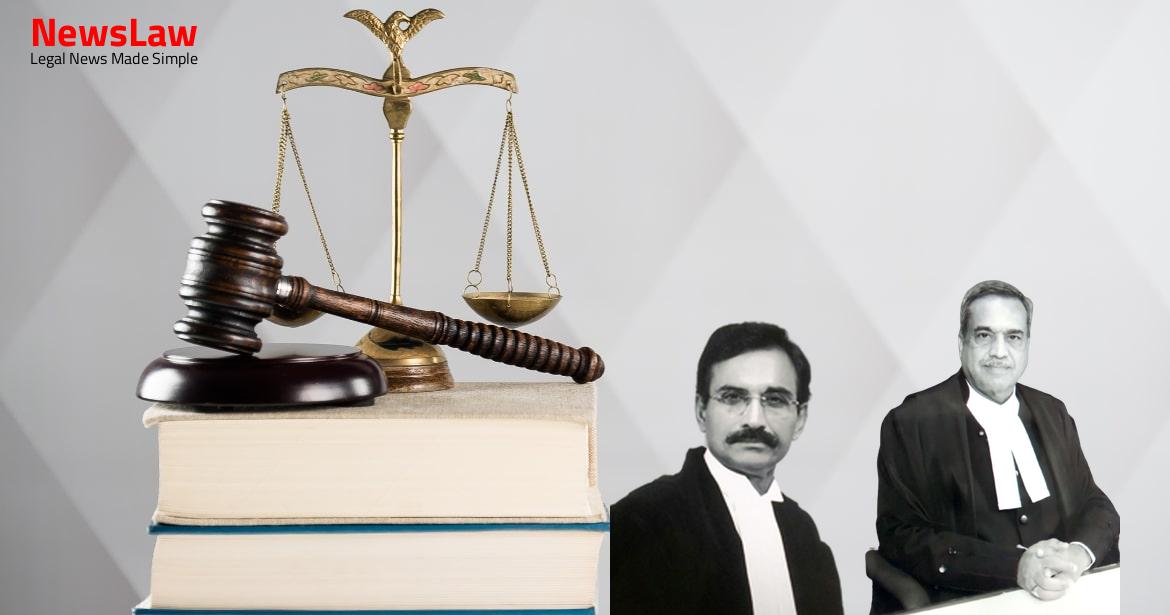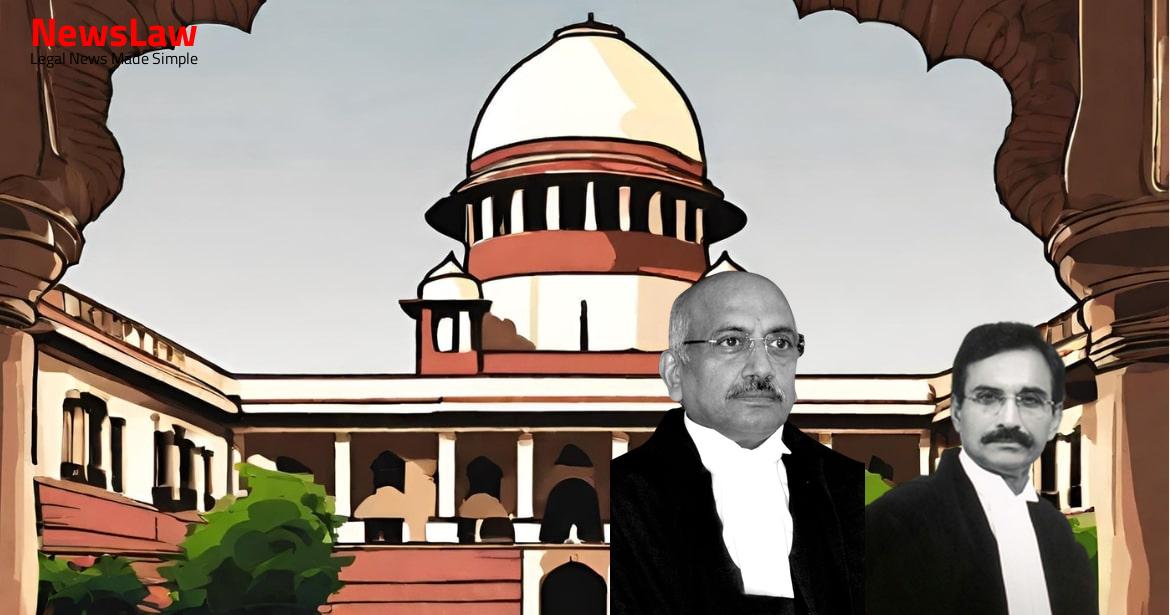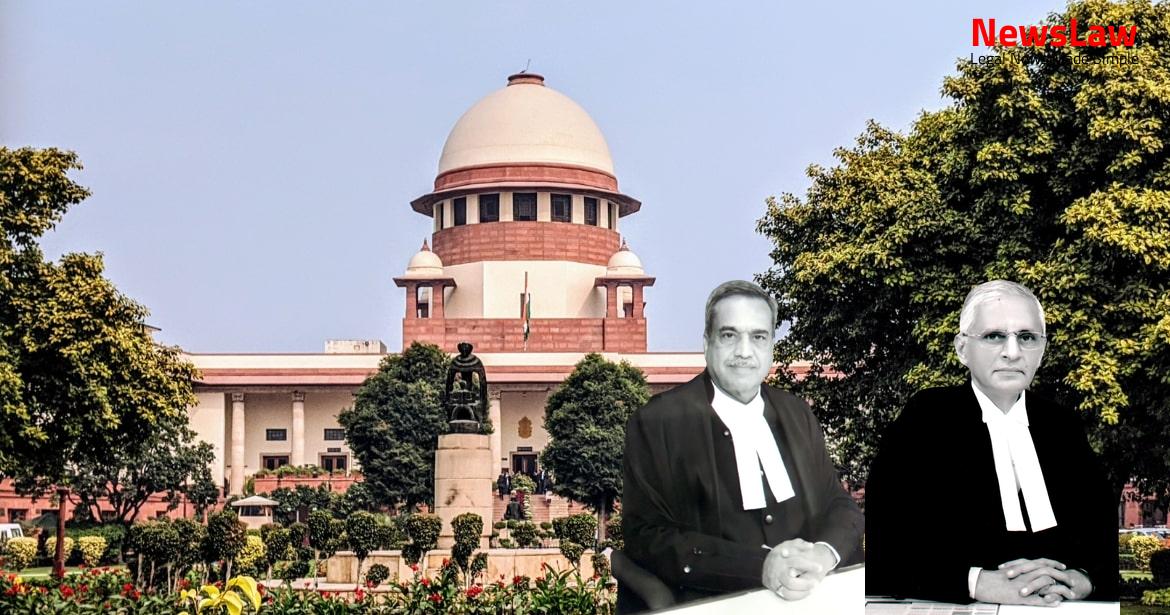Exploring the implications of the Limitation Act and Probate Law, the Supreme Court of India delivers a significant judgement in the case involving the application for letters of administration. The case delves into the complexities of probate proceedings and the continuous right to apply for probate or letters of administration. Stay informed on the latest legal developments with this insightful analysis of the case before the Supreme Court of India.
Facts
- The learned Single Judge refused to reject the plaint under Order VII Rule 11 of the CPC citing similarity to provisions of Section 222 and 276 of the Act which do not have a prescribed period of limitation.
- The learned Single Judge opined that since there is no period of limitation for submitting an application under Section 228 of the Act, Article 137 of the Limitation Act is not applicable.
- The appellants appealed the Single Judge’s decision to the Division Bench through F.A.O(OS) No 11 of 2009.
- The Division Bench upheld the Single Judge’s decision, leading the appellants to file the present appeal against the Division Bench’s judgment.
- Late Smt. Kailash Kapoor, a permanent resident of England, executed a will dated 16.05.1990 bequeathing all her assets to two of her grand-children.
- After her death, the High Court of Justice, District Probate Registry of Birmingham, England and Wales issued a probate for the said will on 21.11.1997.
- Smt. Kailash Kapoor passed away on 10.09.2001 in England.
- The appellants disposed of all the immovable properties of the testatrix between 6.9.2000 to March 2001 as per the will.
- A probate had been granted in England by approaching the court there, following which a petition for letters of administration for property in Delhi was filed by the original applicant, which led to the current legal dispute.
- It was argued on behalf of the appellants that the petition for letters of administration is barred by limitation after the probate has been granted in England for more than three years.
- The application to reject the plaint on the basis of limitation was opposed by the original applicant.
Also Read: Address Update Requirement: Legal Implications for Corporate Entities
Issue
- Article 137 of the Limitation Act applies to petitions for grant of probate or letters of administration.
- Article 137 of the Limitation Act also applies to applications for letters of administration under Section 228 of the Act.
- The ‘right to apply’ accrues for applications for grant of probate or letters of administration under Section 228 of the Act at a specific point.
Also Read: Army Discharge Case: Upholding Justice for Long Service Rendered
Arguments
- The appeal is vehemently opposed by the advocate representing the respondent no.2.
- The application under Section 228 of the Act is deemed barred by the law of limitation and subject to rejection based on Order VII Rule 11(d) of the CPC.
- An application under Section 228 needs to be based on a will that has been probated and authenticated by a competent court in a foreign jurisdiction.
- The right to apply for probate is considered a continuous cause of action until the will is probated.
- Article 137 of the Limitation Act does not apply to petitions for the grant of probate and letters of administration filed under Section 276 of the Act until the will is probated.
- The Division Bench and the Single Judge did not err in concluding that an application under Section 228 would not be barred by limitation as Article 137 of the Limitation Act would not apply.
- The right to apply under Section 228 accrued for respondent no.2 on 21.11.1997 when the will was granted probate in the UK.
- Previous probate proceedings in a foreign jurisdiction are considered ‘in rem’ and subject to the law of limitation.
- The Single Judge erred in equating the provisions of Sections 222, 276, and 228 of the Act.
- Article 137 of the Limitation Act applies to all petitions filed before a Civil Court under any Act.
- The scope of inquiry under Sections 228 and 276 is distinct with the former requiring a recognized and authenticated will.
- An application under Section 228 is maintainable only when a will has been probated and deposited in a competent court.
- The scope of enquiry under Sections 228 and 276 differs as the will in Section 276 is unrecognized and yet to be proved.
- It is prayed to dismiss the present appeal as the father of the appellants and respondent no.2 had given ‘No Objection’ to the said probate.
- Respondent no.2 is not obligated to apply for letters of administration in Delhi as per law.
- In cases where the probate is not objected to, respondent no.2 had no reason to seek the same.
- The ‘right to apply’ under Article 137 of the Limitation Act never accrued against respondent no.2.
- Both the learned Single Judge and the Division Bench rightly dismissed the application under Order VII Rule 11(d) of the CPC and refused to reject the plaint.
- The probate proceedings before the court in England were never objected to and there was no objection to the grant of probate.
Also Read: Justice Served: Supreme Court Ruling on CBI Inquiry against Army Officer
Analysis
- The application for letters of administration was submitted after the limitation period of three years as prescribed under Article 137 of the Limitation Act, thus making Probate Case No. 15/2001 barred by law of limitation.
- The duty associated with the administration of the estate is moral and not legal, requiring only recognition from the court to perform the duty.
- The proceedings for the grant of probate or letters of administration are not considered legal actions under Article 137 of the Limitation Act.
- The right to apply for letters of administration is a continuous right which can be exercised as long as the trust or its objects exist.
- The period of limitation provided under Article 137 of the Limitation Act begins from the date the will is probated.
- The application for probate or letters of administration is covered by Article 137 of the Limitation Act even before the will is probated.
- Section 228 of the Act is akin to Section 276, enabling the application for letters of administration based on an authenticated copy of the will.
- The ‘right to apply’ under Section 228 of the Act had accrued on 21.11.1997, requiring submission within three years.
- The period of limitation for an application for probate or letters of administration with will starts from the date the ‘right to apply’ accrues.
- An application for the court’s permission to perform a legal duty created by a will or for recognition as a testamentary trustee is a continuous right that can be exercised after the death of the deceased
- The right to apply may not necessarily be within 3 years from the date of the deceased’s death
- The petition should include specific details based on whether the application is to the District Judge or a District Delegate
- If any portion of the assets likely to come to the petitioner’s hands is situated in another state, the petition should also state the amount of such assets in each state
- No specific period is prescribed under the Limitation Act for filing an application for probate, letters of administration, or succession certificate.
- The right to apply for probate or letters of administration does not necessarily accrue on the date of the deceased’s death.
- Probate or letters of administration issued by a competent court serve as conclusive proof of the legal character globally.
- Proceedings for grant of probate or letters of administration are considered actions in rem, not actions in law.
- An application for probate or letters of administration is essentially seeking the court’s permission to fulfill a legal duty as per a will or to be recognized as a testamentary trustee.
- This right can be exercised at any time after the death of the deceased as long as the right to do so survives and the trust or any part of it remains to be executed.
- The observations made by the Madras High Court in S. Krishnaswami case were approved by this Court in terms of the nature of the petition for grant of probate or letter of administration.
- The cause of action in the case started from the date the appellants began intermeddling with the properties bequeathed to the respondent after the father’s passing in 2000.
- The High Court, both the Single Judge and Division Bench, rightly refused to reject the application under Order VII Rule 11 of the CPC.
- The application for letters of administration was not clearly barred by the law of limitation and should not have been rejected under Order VII Rule 11(d) of the CPC.
Decision
- The present appeal fails and is dismissed.
- No costs are awarded in this case.
- Decision is based on the facts and circumstances of the case.
Case Title: SAMEER KAPOOR Vs. THE STATE THROUGH SUB DIVISION MAGISTRATE SOUTH
Case Number: C.A. No.-010482-010482 / 2013



